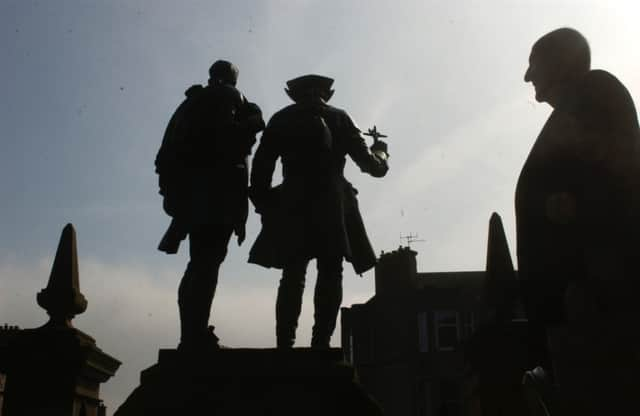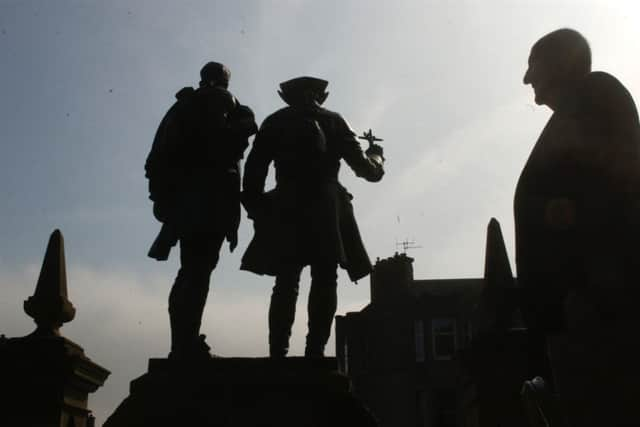Joyce McMillan: Give us bigness of heart to reach out


IT WAS a few weeks ago, in the middle of the Edinburgh Festival, that the e-mail arrived from Graham McLaren, associate director at the National Theatre of Scotland. He was asking me to step out for a day from my role as a theatre critic, and to become one of dozens of people from all over Scotland who would take part in the NTS’s huge eve-of-referendum Blabbermouth event at the Assembly Hall in Edinburgh, a kind of giant day-long family party for the nation, at which everyone taking part would read or otherwise perform a favourite piece – prose, poem, speech or song – made in or for Scotland.
I don’t know exactly what I expected, when I accepted the invitation; certainly not the rich, warm, wonderful interweaving of words and music and light that wrapped around me as soon as I reached the Assembly Hall on Wednesday, or the open-hearted, all-embracing celebration that unfolded as the day and evening rolled on, involving Scottish stars like Liz Lochhead, Alex Norton and Douglas Henshall, the fabulous Blabbermouth ceilidh band led by Karine Polwart, and some less well-known voices. Two veterans of the Upper Clyde Shipbuilders work-in read movingly – but with added jokes – from the speeches of Jimmy Reid and Jimmy Airlie; a Labour No campaigner from Fife read a beautiful short poem by a Yes-supporting friend of his, about the pain of divorce.
Advertisement
Hide AdAdvertisement
Hide Ad

What I did know was that it would not be easy to choose what I would read, in that historic place, in such company, at such a momentous point in our history. Yet as this week dawned, with the polls almost evenly divided, and Scotland adding another great “antisyzygy” – Yes or No – to a history already marked by so many dramatic divisions, I found that there was one voice above all that I wanted to recall, on the eve of the referendum. It was the voice of Robert Louis Stevenson, wise, loving, full of compassionate storytelling energy, in the final chapter of his great novel Kidnapped; the chapter in which his young hero, David Balfour, walks back down into Edinburgh to take up his inheritance, carrying with him all he has learned during his months of adventure in the Highlands in the company of the romantic Jacobite outlaw, Alan Breck Stewart.
So I found myself, at lunchtime on Wednesday, explaining to the audience in the Assembly Hall how I reached my choice: how this novel takes us back to the year 1751, just 44 years after the Union with England and Wales, and six years after the bloody Jacobite rebellion that almost tore the nation apart, in the attempt to overthrow the Protestant Hanoverian monarchy, and restore a Stewart king to the throne.
Young David Balfour belongs to the kind of well-doing Protestant Lowland family that was beginning to benefit from the new Union, and to see what they could make of it, in terms of trade and opportunities; Alan Breck Stewart represents a different Scotland entirely, Highland, Gaelic-speaking, rebellious, looking to allies in France rather than England, and still dominated by traditional clan structures, with all their dense networks of loyalty and honour.
Yet the point of the novel lies in the deep, rich bond of friendship and even love that develops between these two very different men.
In the book’s final sequence, we see them take leave of one another on Corstorphine Hill, as Alan goes back into hiding, and David walks on into the city; David describes his wrenching sense of loss at the separation, how he feels that he might “sit down by the dyke, and cry and weep like any baby”. Around noon, he arrives in the city, walking in by the West Kirk and the Grassmarket. He is struck into a kind of amazement by the towering height of the buildings, the crowds, what he calls “all these braws and novelties.” Yet instead of being delighted, he cannot stop thinking of Alan, whom he has left behind; he has, he says, “a cold gnawing in my inside, like a remorse for something wrong”.
And I doubt if there is, anywhere, a much better description of the emotional aftermath of a separation between people who are nonetheless bound together by a deep bond of affection.
Advertisement
Hide AdAdvertisement
Hide AdIn the world of 1751, David Balfour’s Scotland is the undoubted winner, Alan Breck Stewart’s outlawed and defeated; Stevenson perfectly understands all the tensions that shape their relationship, between Highlander and Lowlander, Protestant and Catholic, loyalist and rebel.
Yet still, without each other, these two halves of Scotland feel incomplete, and somehow bereft; and as young David turns his face towards the future – a bustling, practical, prosperous future, no doubt – he carries with him a sense of something lost, some element of pride or honour or romance or wholeness that leaves an ache in his heart, and that he can never forget or dismiss.
What Stevenson is suggesting, in other words, is that the healing of wounds caused by such major division begins with our ability, as human beings, to carry in our hearts some part of the other side of the argument – or some person on the other side of the argument – and not to let that bond go, or to slip into denial that it is there.
Today, of course, we are boundlessly lucky to be able to express our deep differences of opinion at the ballot box, rather than on bloody battlefields like Culloden.
For our future Scotland, though, the key to that continuing civility lies in our power to listen to, to care for, and to learn from, those who have stood on the other side of one of our great schisms.
We are a nation divided, as ever; yet our future depends not on any false front of unity, but on whether we have the bigness of heart to reach out to the “other” Scotland that always walks beside us, in affection and understanding.
Here’s Stevenson writing about the moment of farewell, as David and Alan Breck Stewart stand side by side on Corstorphine Hill.
“‘Goodbye,’ said Alan, and held out his left hand. ‘Goodbye,’ said I; and gave the hand a little grasp, and went off, down the hill.”
SEE ALSO